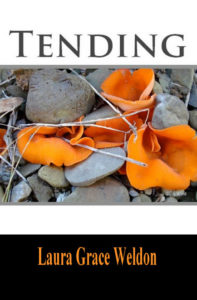 Review by Ivy Rutledge
Review by Ivy Rutledge
Laura Grace Weldon’s poetry collection, Tending, tells the story of a life deeply felt. Read from beginning to end, the poems collectively form a larger poem detailing images of farm life, domesticity, family life, and beyond.
Setting the tone for the collection, her opening poem, “Out of Body,” articulates a child’s sense of empathy, using carefully composed images of bodies, weight, and movement. She writes, “I worked to stay in the small body/my being was given,” then slips out of that embodiment, working her way through a series of expanding scenes. She sees “people hauling heavy lives” and searches for the boundaries between herself and the world she experiences.
Her poetry telescopes into the close details of the rituals of life and then back out, exploring connections with the natural world. For example, in “Haying: June 12,” she observes the satisfaction of farm labor with images of her family:
My sons lift bales from the field
a smooth ballet of strength
that plays like baling twine
unrolling steadily throughout the day,
She concludes the poem with “Hay piles up in the barn’s dark recesses/like stored sunlight.” Likewise, in “Why We Walk the Dogs,” she uses images of nature and ritual as comfort, placing her and her husband within a broad spiritual world with lovely lyrical lines such as these:
Then through evening brightness
dozens of blue green dragonflies
swoop around us
in some unknown ritual. We wonder
which of nature’s perfect gestures:
migration, mating, defense
this may be.
The collection is divided into four parts: “Planting,” “Weeding,” “Harvesting,” and “Putting By.” Across the cycle, she explores her relationships with her family. In “Tea Party Manners,” she describes a child’s love and reverence for her mother:
Leaving those tea parties
I sniffed, leaning too close, until my mother said
Blow your nose like a lady.
It was her scent I sought, reassurance
that her face would not sag beyond recognition.
That she would never die.
Moving through love, loss, grief, and legacy, Weldon brilliantly evokes a familiar sadness, as in “Nest Unmade” and “What She Saved.”
Yet, Weldon does not offer a sanitized view of the world she lives in; she includes the darker issues of farming abuses, pollution, sexism, and commercialism. These poems connect a love for the earth and humanity with the global issues of peace and justice. Sprinkled throughout the collection are pieces that are quiet in their provocation but full of punch. For example, in “Larger Stream,” she offers a story of the progress of women, flowing from the story of one woman:
She was old as women are no longer,
wore a house dress, support hose,
stiff laced shoes,
and carried
a longing left undone.
And in an artful depiction of what is happening across the country to our family farms, in “Chains, Bars,” she writes about mortgage debt: “The children are quiet./We look at you/not looking at us./Your posture howls/of a man trapped/and we, your family,/keep our distance like jailers.” In a more explicit commentary, she writes in “New to the City,” a description that is rich with the imagery of darkness and weight, echoing earlier poems in the collection: “Pavement caps a prisoned forest/where soil bears the city’s heft/and seeds lie waiting/for a lost sun to resurrect them.”
The final section of the collection, “Putting By,” offers a sense of legacy. In “Aluminum Epiphany,” she imagines the “archeologists of the future” and the remnants of “indifferent opulence” that they find. Following on a more personal note, she lists wedding gifts: well-used, loved objects symbolizing the same longevity and care that she and her husband have put into their marriage and family. She concludes with “Overhead Calls,” where she gracefully pulls together the by-now familiar contrasts between the general and the specific, the abstract and the concrete, and the old and the new. With the detailed world she’s described, Laura Grace Weldon leads her reader to find a loving, empathic connection to humanity, warts and all.
Tending, by Laura Grace Weldon
ISBN 9780615913421
Aldrich Press, 2013
90 pages
Originally from Rhode Island, Ivy Rutledge lives and writes in the Piedmont of North Carolina, where she shares her life with her husband and two children. Her work has appeared in The Sun, Home Education, Ruminate, The Copperfield Review, and Tilt-a-Whirl, and she recently had a short story included in the Main Street Rag anthology, Altered States. She is currently pursuing an MA in English at the University of North Carolina at Greensboro. You can follow her on Twitter at @IvyRutledge.
